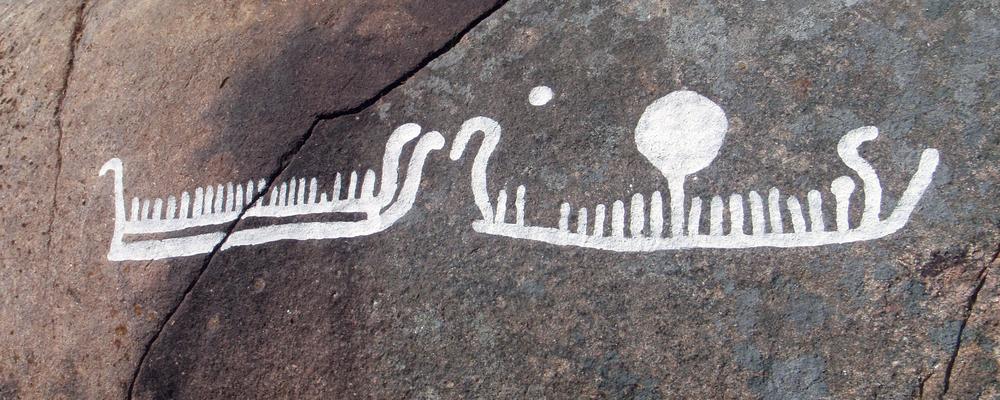
- Home
- News and events
- Find news
- Research programme in archaeology and computational linguistics gets SEK 80 million
Research programme in archaeology and computational linguistics gets SEK 80 million
Two big research programmes at the Faculty of Humanities of the University of Gothenburg have been granted over SEK 80 million by the Bank of Sweden Tercentenary Foundation. The programmes are Johan Ling’s Maritime encounters, which will study seafaring in prehistoric times, and Nina Tahmasebi’s Change is key!, which will develop tools for dealing with linguistic changes.
Two of the three big Swedish research programmes that the Bank of Sweden Tercentenary Foundation (RJ) has chosen to fund in 2021 are run by researchers at the Faculty of Humanities of the University of Gothenburg.
Importance of sea crossings in a fresh light
Johan Ling, Professor of Archaeology and Director of the Swedish Rock Art Research Archive, is the main applicant for the research programme Maritime encounters: a counterpoint to the predominant land-based narrative of European prehistory, which is being awarded nearly SEK 47 million.
“With an international interdisciplinary team of researchers, we aim to create a more nuanced narrative about seafaring in prehistoric times, and of the importance of sea crossings for long-distance exchange and development of cultures from a long-term perspective,” says Johan Ling.
Language changes over time
The second University of Gothenburg research programme that has been awarded funding is Change is key! The study of contemporary and historical societies using methods for synchronic semantic variation and diachronic semantic change, which has received SEK 33.5 million in funding. For six years researchers at Språkbanken Text will be studying language changes over time – within various groups and in various types of media.
“This is proof positive that the research we’re doing at Språkbanken Text is of high quality internationally,” says Nina Tahmasebi, the main applicant for the programme.
The Saga archives
The Centre for Digital Humanities (CDH), which is involved in Maritime encounters, is also taking part in the project The Saga Archive: Mapping and Visualizing a Swedish Children’s Book Series (1899–1970), which has been awarded SEK 5,526,000 from the Bank of Sweden Tercentenary Foundation (RJ). The Children’s Library Saga consists of 22 shelf metres of largely unresearched fiction that researchers wish to make available through the project by digitalising it – not only for other researchers but also for children and interested members of the public. The project is being run by the Swedish Institute for Children’s Books, and as well as CDH and the Swedish Literature Bank.
Early Slavonic manuscripts
Antoaneta Granberg, Associate Professor in Slavic Languages, is taking part in an infrastructure project that has received a grant of SEK 959,000.
The project Migration of the database “Cyrillic and Glagolitic Books and Manuscripts in Sweden” to ALVIN is a collaboration between researchers from Umeå University, Uppsala University and the University of Gothenburg.
The database to be migrated contains approx. 700 records with descriptions of early Slavic manuscripts and printed books in Cyrillic or Glagolitic script, which are preserved at approximately twenty Swedish libraries and archives. ALVIN is a digital platform for the long-term preservation and accessibility of digitised and as yet not digitised cultural heritage materials at Swedish cultural heritage institutions
Six additional research projects at the University of Gothenburg have been awarded grants, and three researchers are being granted funding under RJ Sabbatical for research.
Research projects granted funding
Benjamin Lyngfelt’s language studies project Linguistic networks: Connecting constructions within and between languages has been granted SEK 6,966,000.
Using construction grammar, the project aims to develop a network that describes Swedish language constructions and link them to constructions in other languages. It will also expand a database.
“It’s fantastic to get this opportunity. We’ve been thinking about these matters for a long time, but they’re too big to deal with in dribs and drabs. There’s now a whole group of us who can work together on this for an extended and continuous period, and that’s exactly what is needed. Plus it’s more fun this way,” says Benjamin Lyngfelt.
Valgeir Thorvaldsson’s project in psychology Generation differences in determinants of cognitive ageing: Comparisons of five population-based representative Swedish cohorts born 44-years apart and followed from age 70 on multiple occasions has been granted SEK 4,371,000.
The project will investigate time trends and the significance of various factors that affect cognitive ageing.
Stefan Tengblad’s project in business administration Investigating the distinctive features and resilience of human resource management in the Nordic countries: A longitudinal and cross-national study has been granted SEK 4,288,000.
The project will study how labour markets in the Nordic countries have been affected differently over time, and in the light of the COVID-19 pandemic.
Johan Karlsson Schaffer’s project in political science Litigating land rights in Sápmi: Indigenous legal mobilization in Finland, Norway and Sweden has been granted SEK 3,171,000.
The project will combine methods in order to explain Sápmi legal mobilization and its broader effects on Sápmi groups and Nordic communities.
Eva Ranehill’s economics project Gender differences in the career progression of academic researchers: the importance of performance evaluations, self-selection and performance has been granted SEK 2,857,000.
The project will study gender distribution in academic researcher appointments and analyse whether any gender differences can be explained by gender differences in performance evaluations and/or application patterns.
Matilda Amundsen Bergström’s project in history of ideas and science A Happy Life. Women’s Moral Philosophy in 17th- and 18th-Century Scandinavia has been granted SEK 2,242,000.
The project explores how female intellectuals treated these fundamental philosophical issues in 17th- and 18th-century Scandinavia.
Researchers who have been granted funding under RJ Sabbatical
Henrik Björck, History of Ideas and Science, A hat parade through the history of science: Doctoral educations in the history of the Swedish system of higher education SEK 1,272,000.
Lena Larsson Lovén, Classical Archaeology and Ancient History, Ancient Roman Textiles: In Past Societies and in Modern Museum Collections, SEK 948,000.
Ingrid Ryberg, Film Studies, Swedish film feminism, SEK 747,000.
Text: Johanna Hillgren